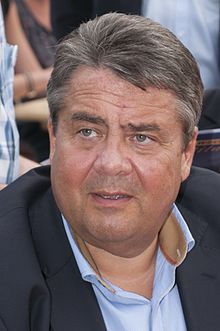German Foreign Minister
|
Germany Federal Minister for Foreign Affairs German: Bundesminister des Auswärtigen |
|
|---|---|
 |
|
| Federal Foreign Office | |
| Formation | 21 March 1871 |
| First holder | Hermann von Thile |
| Website | auswärtiges-amt.de |
The Federal Minister for Foreign Affairs (German: Bundesminister des Auswärtigen) is the head of the Federal Foreign Office and a member of the Cabinet of Germany. The current office holder is Sigmar Gabriel. Since 1966, the Foreign Minister has often also simultaneously held the office of Vice Chancellor.
The Foreign Office was established within the North German Confederation in 1870 and its head, first appointed in 1871, had the rank of Secretary of State. As the German constitution of 1871 installed the Chancellor as the sole responsible government minister and since the Chancellor generally also held the position of Foreign Minister of Prussia, the Secretary of State fulfilled a more subject role as an assistant to the Chancellor, acting largely to draft correspondence rather than to actually direct the formation of foreign policy. This was especially true during the chancellorships of Otto von Bismarck (1871–1890) and Bernhard von Bülow (1900–1909), both of whom had considerable prior experience with foreign affairs, while secretaries at other times wielded more influence over the foreign policy.
In 1919, the Weimar Republic elevated the head of the foreign office to the position of Foreign Minister responsible for his department. As governments were now formed by parties entering coalitions with each other, individual ministers also gained independence towards from the chancellor.
After a succession of short-lived ministers, Gustav Stresemann, leader of the small National-liberal German People's Party, held the office of Foreign Minister in successive cabinets from 1923 to his death 1929. His long term gave stability to Germany's foreign policy and improved the minister's position towards the relatively weak and short-lived chancellors. Stresemann was awarded the 1926 Nobel Peace Prize for his work for reconciliation between Germany and France.
...
Wikipedia

